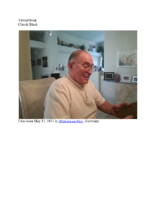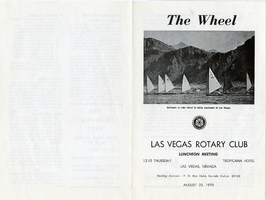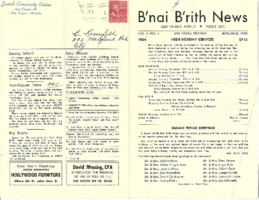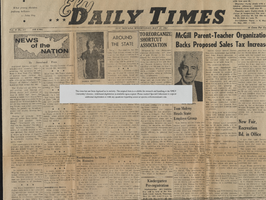Search the Special Collections and Archives Portal
Search Results
Brown, Lori Lipman, 1958-
Former Nevada State Senator Lori Lipman Brown works as a lawyer, educator, civil rights advocate, and secular activist in the United States. Born in New York on June 17, 1958, Brown graduated from the University of Nevada, Las Vegas (UNLV), and then received her Juris Doctor from Southwestern University School of Law in 1983. After working as an attorney, Brown returned to UNLV and took courses to get her teaching license and went to work as a high school teacher.
Person

Transcript of interview with Marie Jordan by Edward Gentry, February 27, 1981
Date
Archival Collection
Description
On February 27, 1981, Edward Gentry interviewed Marie Jordan in her home in Las Vegas, Nevada. The two discuss social differences between Arizona and Las Vegas, particularly in the ways schools were segregated in Las Vegas. Jordan also discusses the “Whites Only” policy on the Strip and Downtown. The interview concludes with Jordan sharing her views on the importance of helping others.
Text

Alpha Kappa Alpha Sorority 75th Far Western Region conference materials
Date
Archival Collection
Description
From the Alpha Kappa Alpha Sorority, Incorporated, Theta Theta Omega Chapter Records (MS-01014) -- Chapter records file.
Text

Biographical essay by Claude Black, 2014
Date
Archival Collection
Description
Claude Black describes his family's escape from Germany to Santiago, Chile, and eventually settling in Chicago, Illinois. The essay is illustrated with images of his family and documents from their journey.
Text
Nevada Political Buttons Collection
Identifier
Abstract
The Nevada Political Buttons Collection contains campaign buttons from 1972 to 2000. The collection includes buttons for political candidates at the federal, state, and local levels, including Bill Clinton and Al Gore for President of the United States, Harry Reid for United States Senate from Nevada, Bob Miller for governor of Nevada, and various candidates for Nevada's state legislature and other elected positions. The collection also contains buttons from some of Nevada's local political organizations, including Las Vegas, Nevada's branch of the Culinary Union, Nevada Fair Pay Coalition, and No Nuclear in Nevada.
Archival Collection
Patricia Vazquez oral history interviews
Identifier
Abstract
Oral history interviews with Patricia Vazquez conducted by Marcela Rodriguez-Campo, Monserrath Hernandez, and Rodrigo Vazquez on November 14, 2018 and June 14, 2019 for the Latinx Voices of Southern Nevada Oral History Project. In these interviews, Vazquez discusses growing up in Las Vegas, Nevada before moving to Mexico. She talks about the transition of moving back to the United States from Mexico in 1970. Vazquez then describes how she was selected for special education in elementary school because she did not speak English, her education experience in the Clark County School District, and later being placed into Advanced Placement classes. She then shares coming out as a lesbian, her family dynamics after announcing her sexuality, and talks about what it is like to come out in the Latinx community. Vazquez describes her art and explains that her paintings depict moments in her life that defined her as a person. Later, Vazquez describes her involvement in queer activism in Las Vegas through the Latino Youth Leadership Conference and Planned Parenthood. Lastly, Vazquez discusses her involvement in diverse hiring committees for the College of Southern Nevada (CSN), which is a Hispanic Serving Institution (HSI), and teaching literature courses at CSN.
Archival Collection

Transcript of interview with Miriam "Mimi" Katz by Barbara Tabach, December 10, 2014
Date
Archival Collection
Description
In this interview, Mimi Katz discusses growing up in the Boston area and her schooling, and moving to Washington, D.C. working as a physiotherapist. She returned to Boston and met her husband, and she talks about moving to Las Vegas and adjusting to life here. They became involved at Temple Beth Sholom, and Mimi worked as a conventions coordinator at the Sands and the Sahara. She discusses moving around in Las Vegas from an apartment to a house in the John S. Park neighborhood, working for the Jewish Federation, and helping to develop the Holocaust education program with Edythe Katz, conducting oral history interviews with survivors. She continued working at the Convention Center in the 1980s, and is involved in the Lou Ruvo Center.
Everyone knows her as Mimi. She was born Miriam Green to immigrant parents in Boston, Massachusetts, in 1926. As a youngster she danced, excelled at school and enjoyed an abundance of sports. To pay for her higher education at Massachusetts School of Physiotherapy she worked at Raytheon Manufacturing. In 1957 she married George Katz who swept her away to their honeymoon in Las Vegas. It's a story that she loves to recall-they never left. She sent for her things and energetically settled in to her new hometown and marriage. Mimi found employment with the Clark County School District, began having children (three daughters), and making fast new friends. Many of these friends were from the founding days of Temple Beth Sholom, which roots her to the history of the local Jewish community. In addition, for a decade she worked in community relations for the Jewish Federation. She valued community activism and volunteered over the years for many organizations; such as Easter Seals, Jewish War Veterans, Parent Teachers Association and the Lou Ruvo Center for Brain Health, and many more organizations over the subsequent decades.
Text

The Wheel Las Vegas Rotary Club newsletter, August 20, 1970
Date
Archival Collection
Description
Text


